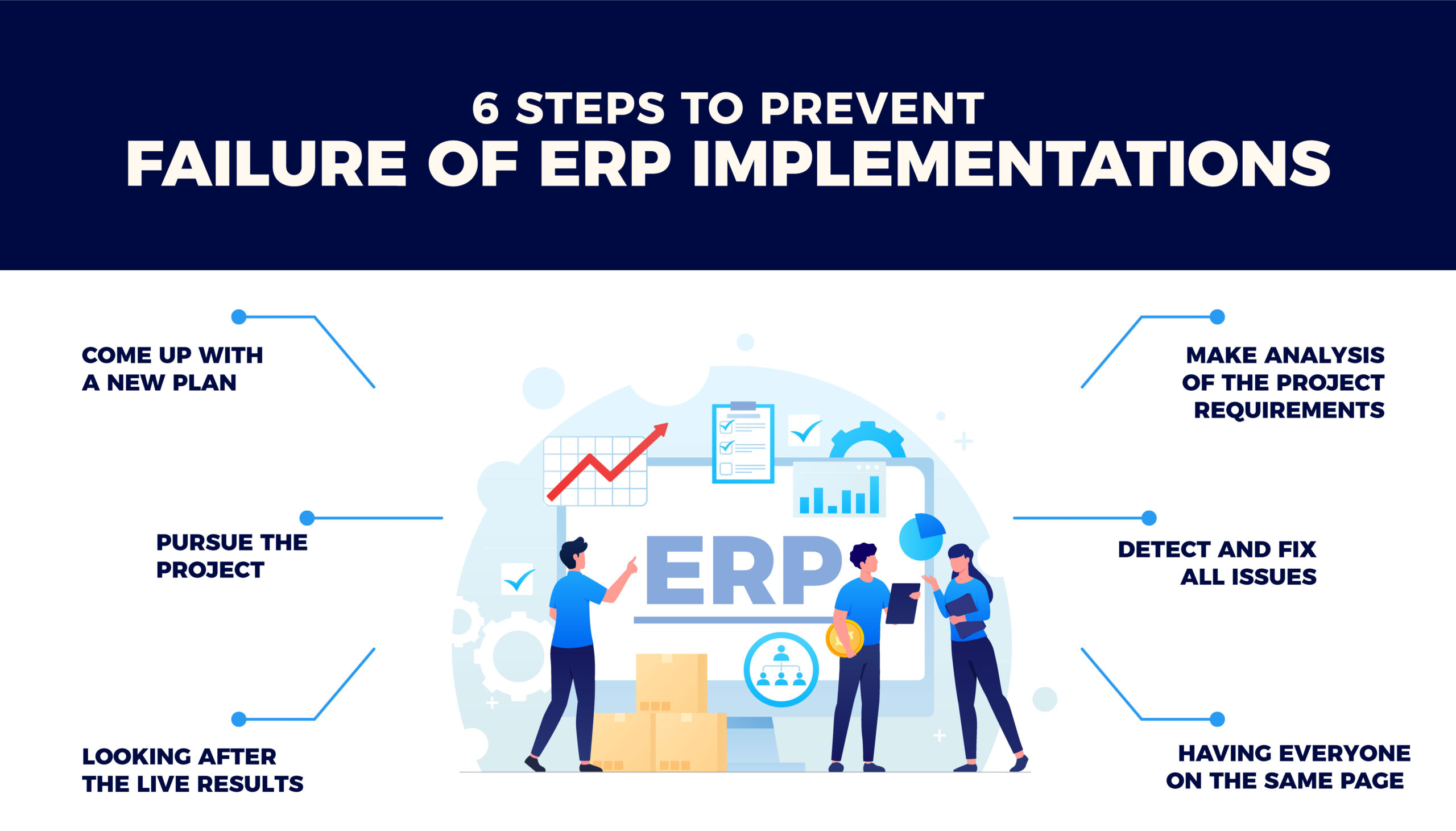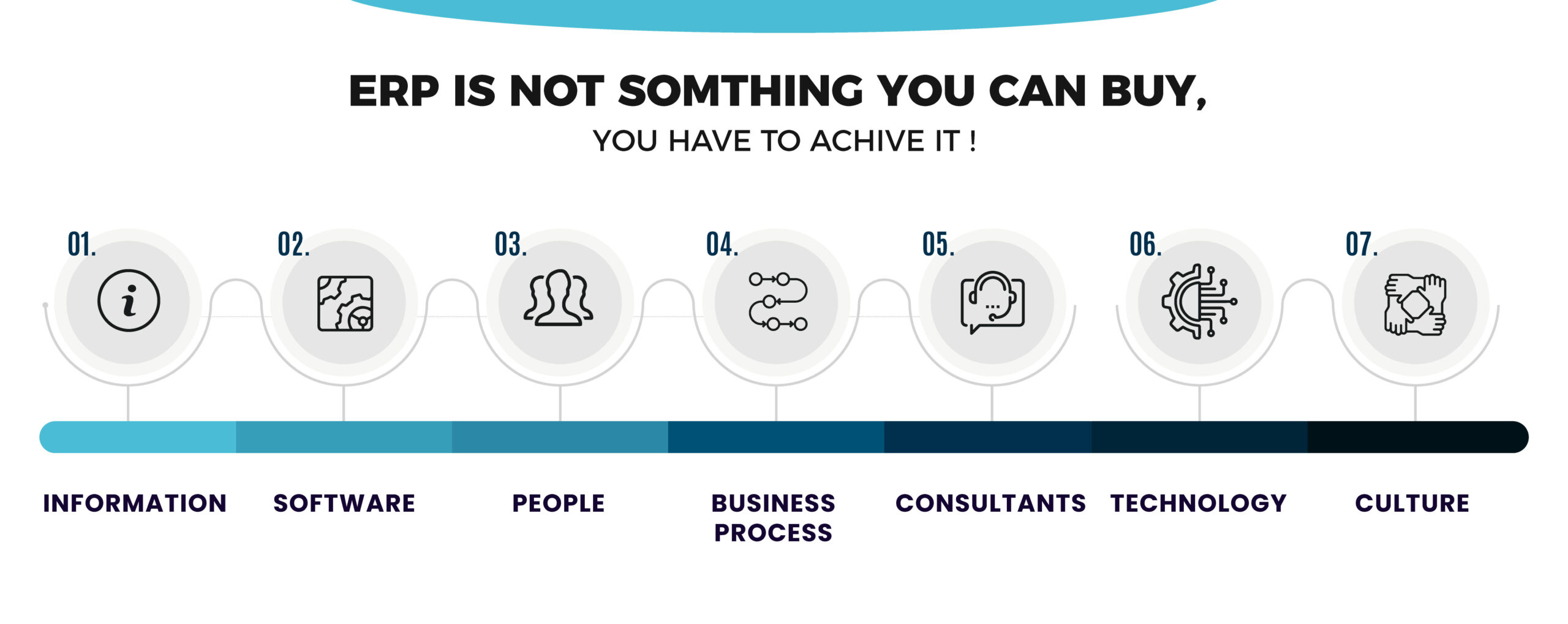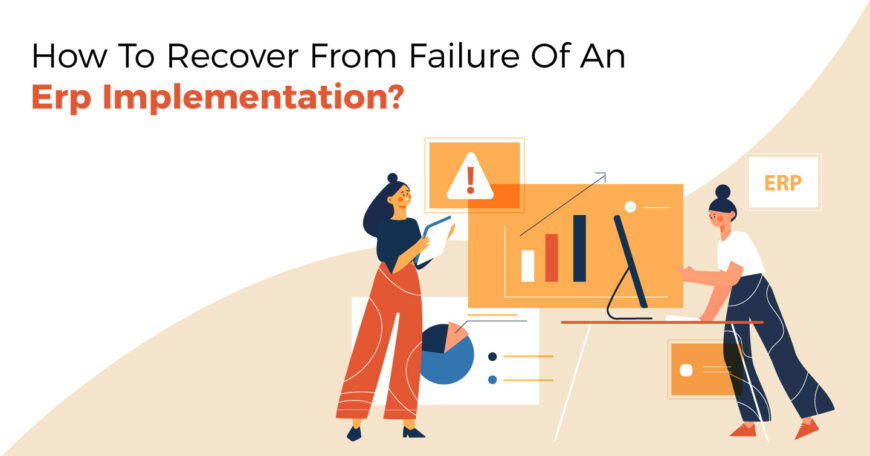The outcome of any software project whether in respect of development or implementation does not always meet the expectations of the developers. Particularly when it comes to ERP implementation or integrating legacy systems with the ERP system, the project may fail to deliver expected outcomes. In some implementation projects where the budget goes well over expectations, it is considered a failure.
When ERP implementation goes wrong, you must be asking in surprise what really happened. You can feel completely clueless about how the project went wrong. Is it a fault on the part of the ERP partner? How can you get the original implementation plan back on its track? But before that, you must have a comprehensive idea about the reasons behind the failure of these projects.
Well, based on the experience of leading ERP implementation partners, we can go deeper into exploring the key reasons for ERP implementation failure. Any experienced ERP integration partner who has been in the trade for years will tell you to take a closer look at the following areas to find out the weaklings and the ways to fix them.
4 Key Areas To Find Out Why ERP Implementations Fail

Features & Functionality
It is advised that for unsuccessful ERP implementation, you first should make sure that all earlier steps have been duly completed. One of the most important steps in this evaluation process is to have a closer look at the features and functionalities that went through changes in the process. Just consider finding out whether any of the functionalities have just changed. When you take stock of this data, the course correction for the failed implementation of the ERP can be more efficiently completed.
Data
The second important area where you need to try to find out the fault lines is the data. To get rid of vulnerable data you need to carry out data cleansing. This is important to evaluate the relevance of all information that is going to be utilised by the ERP software. This process is important for bringing the entire implementation project back on its track. When the data remains unorganized and they are used by the new ERP software, there will be increased difficulties.
Integrations
The third most important area where the project can easily go wrong is the integration of different legacy software systems and the applications used by various departments of the business. What is going to be the departments and systems that are going to transfer data to the new ERP system? You need to have a clear view of all the integrations you need to undertake.
Few More Reasons Of Why An ERP Fails:

System Infrastructure
At last, you should have your reasons clear for the ERP execution plan you are undertaking. It is quite understandable that the team behind the project will continue to work to ensure the smooth functioning of everything so that the software easily allows the end-users to get things done. Here you also need to take into consideration all the different requirements for implementing the new ERP software so that nothing remains overlooked. For example, if the managers need to use a mobile interface to track the inventory, it must be facilitated.
How To Prevent Failure Of ERP Implementation?

Though it seems to be irrevocably complex to take care of all the issues that can lead to an implementation failure, it is always possible to make the course correction in case such execution or implementation went wrong. This is where exploring the above-mentioned areas will help in revealing the underlying problems.
In the case of custom ERP software development or customisation of an ERP system, it must pass through the project analysis, design prototyping, core development, QA testing, value additions and changes management, employee training, documentation and deployment. Most of the leading NetSuite integration partners are of the opinion that whenever all these stages are taken care of completely from start to finish, there can be fewer chances of failure.
When fault lines appear the most important thing is to detect the underlying issue responsible for the ERP implementation failure and address that. It is in this context that one should not avoid making uncomfortable questions only to find out the faults and do everything to resolve the same. Often it is seen that detecting the issue becomes harder than solving it. This is where expert ERP consultants can help. VNMT Solutions as a leading Netsuite ERP implementation and integration partner can help your business with expert consultants with years of experience in bringing failed ERP projects back on track.
ERP implementation can fail due to many factors. Here are the actual steps to fix the issues and make corrections for ERP implementation failure.
Make An Analysis Of The Project Requirements
Any ERP implementation consultant that encounters a failed project, will make it a priority to analyze the situation first. As soon as they understand the situation, they are likely to take stock of several contributing factors. First of all, they would like to take a closer look at the particular software that needs to be implemented and the effects of the implementation.
Secondly, the ERP expert would also like to analyze the skills of all the team members in the project team and can consider adjusting and re-fixing the roles and responsibilities of the team members for a better outcome. Thanks to this it can be assured that every team member works to the best of his abilities. With these two steps carried out perfectly, addressing the issues can be much easier.
Detect And Fix All Issues
As and when necessary, the expert dealing with the failure of ERP implementation may venture to find issues with the project plan and fix them. They can do this by collaborating with the important employees, and department heads to detect what went wrong with the project and if there is anyone who can help fix it or can give vital inputs.
As soon as they find any issue, the expert implementation consultant can just collaborate with the key team member to carry out a specific task necessary for fixing it. At certain times when the ERP implementation consultant finds that the employees lack the skills and knowledge necessary for the project, they can just facilitate training for the employees or key team members.
Having Everyone On The Same Page
There are many instances when a delay in execution is mainly caused by differences of opinions among the team members. There can be several different agreements and disagreements corresponding to a software project. The biggest difference that surfaces most of the time is how the new ERP software will work and how new processes will be changed because of this.
Corresponding to implementation any kind of confusion can ultimately lead to project delay and a lot of issues. Bringing everyone on the same page regarding how the implementation will work and how the goals will be achieved is a crucial factor. A lot of opposing and contrasting opinions from the team members can ultimately lead to project failure. The consultant can decide to go backwards and by delegating the roles and responsibilities can sensitise everyone on the project goal and execution plan.
Come Up With A New Plan
To get the project back on track and solve all the underlying issues the ERP expert consultant can also decide to come up with a new plan for the entire project. Creating a new plan can be highly effective irrespective of whether you have an existing project plan in place or not.
The ERP consultant should also inquire about the timeframe required for the entire implementation project to make sure that every step is duly taken care of. When all the steps, their time frame, corresponding tasks and skills are determined and accordingly the roles and responsibilities are delegated, the project plan becomes more visible.
Pursue The Project
As soon as the project plan is fixed and all have been brought to the same page, this is time for the ERP consultant to pursue the implementation project forward. Since all preliminary steps and requirements are duly taken care of, the project is likely to start rolling on smoothly.
In this respect, the implementation should always be carried out by employees who are not over-stressed and fatigued. By giving responsibilities to the fresh resources the reject can also pump in new energy and pace up the task completion. While you should always delegate tasks to the resources with the right skills and experience, you should also keep an eye on ensuring a high energy level.
Looking After The Live Results
When an expert ERP consultant takes care of the course correction of a stalled implementation and has successfully brought the project back on track, they should not feel relieved until the ERP goes live and starts delivering results for the actual business process. With their vast experience, ERP consultants are often able to predict risks and can accordingly create solutions to prevent them.
Conclusion

If you have understood it right, your stalled ERP implementation project can be brought to the right track from the sidelines if you only follow these steps and implement the above measures. From failure to course correction to ultimate successful implementation in the actual business process, the journey can be monitored and perfected by an expert ERP consultant.















